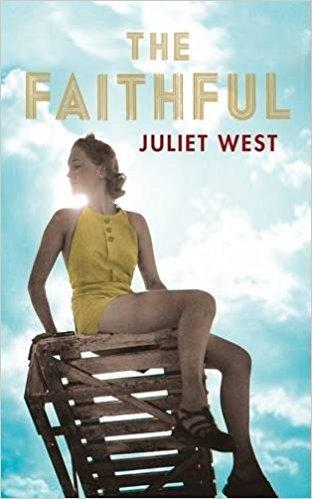 As I mentioned in the introduction to my Summer Reads 2017, unintended patterns often appear when I am putting the selection together, even if the individual titles are completely different. This time round, there was a strong showing for adolescent characters and the coming-of-age theme, which is one of my favourites. That perspective is skilfully handled in Juliet West’s second novel The Faithful but it is one of many angles which she explores to great effect. Another is the examination of social class and the various bridges and barriers between different classes, whether political, social or romantic. There’s been a lot of debate lately about the representation of social class in fiction, and this is what Juliet joins us to discuss today. You can hear my thoughts on her novel in the review which follows:
As I mentioned in the introduction to my Summer Reads 2017, unintended patterns often appear when I am putting the selection together, even if the individual titles are completely different. This time round, there was a strong showing for adolescent characters and the coming-of-age theme, which is one of my favourites. That perspective is skilfully handled in Juliet West’s second novel The Faithful but it is one of many angles which she explores to great effect. Another is the examination of social class and the various bridges and barriers between different classes, whether political, social or romantic. There’s been a lot of debate lately about the representation of social class in fiction, and this is what Juliet joins us to discuss today. You can hear my thoughts on her novel in the review which follows:
It’s well over a decade since I first read Zoe Heller’s Notes on a Scandal, but of all the vivid passages in this book, one in particular seems to have stayed with me. Upper-class Sheba has visited the house of her schoolboy lover, and relates the experience to her confidante Barbara:
There was a nylon-patterned carpet, a display case containing several framed pictures of Connolly and his sister, and a large three-piece suite in beige and cream stripes. Sheba had never actually seen a three-piece suite before, she says. ‘Not in real life.’
Ouch. Even as I bristled in defence of the three-piece suite, I was impressed at the way Heller conveyed class divide so convincingly. Sheba’s guileless amusement at the trappings of a lower-middle-class home tells us all we need to know about her own upbringing. Sheba and Connolly’s relationship is unusual not just because of their age difference, and their teacher-pupil relationship, but because of the class chasm that separates them.
My second novel, The Faithful, opens in 1935 at a seaside camp organised by Oswald Mosley’s British Union of Fascists. My plan was to follow the story of an ‘ordinary’ London family who’d been seduced by Mosley’s blackshirt movement. Class wasn’t something I’d intended to include as any kind of theme, yet when I visited the spot in West Sussex where the actual camp was held, I began to feel differently.
Pryor’s Farm in Aldwick is now a mass of post-war bungalows, and only a leafy twitten remains of the route the blackshirts would have followed as they marched from their campsite down to the beach. Walking that route, I noticed a private, walled estate of older houses – huge detached properties that were built, I later discovered, in the late 1920s and early 1930s. I wondered what these residents would have thought of the blackshirts descending on their exclusive seaside haven. Though Mosley and many of his acolytes were aristocrats, the rank-and-file campers came largely from the working classes. Locals must have been perturbed by the drum parades, the fireside singing, the boxing matches and the sea-bathing sessions.
I imagined a girl from one of the big houses watching the teenage fascist cadets on the beach. She is sixteen and bored. The blackshirts – dismissed by her Bohemian mother as ‘cranks’ – strike her as daring, dangerous even.
And so The Faithful became the story of two teenagers and their very different families: the Alexanders – well-bred, liberal and cosmopolitan – and the Smarts – working-class Londoners who’d been hit hard by the 1930s depression.
For Hazel Alexander, flirting with the blackshirts is a form of rebellion. She meets seventeen-year-old Tom Smart, whose own rebellion is to turn away from fascism, much to the alarm of his Mosley-worshipping mother.
The connection between the two characters is immediate. Hazel is attracted to Tom partly because of his class. She sees herself as a modern girl, unfettered by the social codes of her parents’ generation (though her mother is liberal, she’s also a snob). But Tom is suspicious. He wonders whether Hazel is toying with him, whether her interest is purely an act of condescension.
Writing about Tom and his family, I drew to some extent on my own background as the granddaughter of working class Londoners (as discussed on the Literary Sofa in 2014). I also chanced upon one remarkable novel that was published in early 1939. October Day by Frank Griffin was billed as ‘a novel of the people’ that would establish the author’s ‘high place among proletarian writers.’ A modest success at the time, it then went out of print for decades until a recent reissue. The novel is set in 1936 on the day of the Battle of Cable Street, and follows events through the eyes of several characters. Most striking, for me, was the voice of Joe Slesser, an unemployed labourer who finds himself swept up in the violence.
Creating Hazel’s family required more of a feat of imagination, but here I was lucky to have Elizabeth Jane Howard for inspiration. Her memoir Slipstream is a wonderfully frank and compelling account of growing up in a well-to-do family during the 1930s – it’s clear after reading Slipstream how much of Howard’s own life and experience found its way into her series of novels The Cazalet Chronicles.
Hazel’s mother Francine is a forty-something free spirit, swanning around Sussex and London wishing she were still a Bright Young Thing. Evelyn Waugh’s Vile Bodies made obvious reading to get a sense of Francine’s background. (She was the kind of woman the blackshirts claimed to despise. ‘Bloomsbury Bacilli’, they labeled this set, although in private many fascists – Oswald Mosley notorious among them – were far from conventional in their own lives and marriages.)
Immersing myself in 1930s literature helped to put my characters into social context, but I didn’t want them to be ‘types’. Yes, they are shaped by their class backgrounds, but my chief challenge – as for any novelist – was to create complex, believable people who react in unique ways to the dilemmas and crises they face. Three-piece suites are all very well, but it’s what you get up to on the sofa that really counts…

IN BRIEF: My View of The Faithful
I usually save books I’m particularly looking forward to for the weekend and The Faithful perfectly illustrates why: it was a ‘disruptive’ novel, so compelling that it elbowed other activities (including work) to one side. This was a captivating and enjoyable read with many strengths, stemming from a vivid sense of time and place. It glides between the broad canvas of social and political tensions and turbulence to the intimate scale of individual lives. As with West’s first novel, character and dialog are handled with confidence and insight which makes them very believable; I felt very invested in Hazel’s relationships with Tom, Lucia and especially the fraught and complex dynamics between her and her mother. There is something about the blackshirts which holds a horrible fascination; this story sheds light on that dark period of history alongside much that is universal and timeless. I really couldn’t fault it.
If you missed it due to election overload – or for any reason – last week’s guest post from Stephen May on Manhood got a lot of appreciation and thoughtful comments.
*POSTSCRIPT*
Next week my guest will be Terry Stiastny, author of Conflicts of Interest, another of my summer picks, with a Writers on Location piece on Provence.
Advertisements
